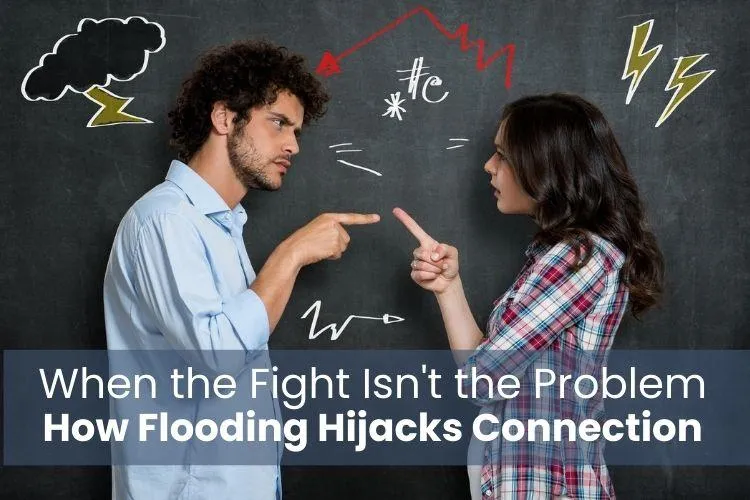

PHYSICAL HEALTH ARTICLES

When the Fight Isn't the Problem
How Flooding Hijacks Connection
It began with something small—a pair of dirty socks left on the floor again. She snapped. He rolled his eyes. Within seconds, they were arguing about everything but the sock: finances, in-laws, last Christmas. The tension in the room was palpable. Hearts were racing. Words were sharper than intended. They were no longer partners; they were opponents. Neither knew exactly how they got there, but both felt completely overwhelmed.
What they didn’t realize was that they were emotionally flooded. And in that state, no honest or productive conversation could happen.
Couples often bicker, argue, and fight. These conflicts will either be romantic or dividing, depending on which of two trajectories the couple chooses to take. One trajectory leads to a competition—a battle to see which partner can escalate enough to “win” the fight. The other path guides the couple into an experience that ends in deeper connection through a clearer understanding of their spouse.
Right now, there seems to be an epidemic of couples getting stuck in that win-lose competition whenever disagreements arise. Flooded with frustration and anger, they make assumptions about each other that kill their ability to listen and truly understand.
Masters of relationships don’t allow themselves to get so flooded with intense frustration or anger that it blocks connection. These couples can turn any disagreement into a romantic venture by using arguments as a way to gain insight into their partner’s beliefs, hopes, and dreams. These Relationship Masters refuse to assume they “already know” what their spouse thinks. They stay curious, allowing growth and change to occur. When they start to feel overwhelmed, they know how to soothe themselves and, when needed, how to help their spouse calm down, too.
Understanding Physiological Flooding in Relationships
Physiological flooding occurs when you or your spouse becomes emotionally overwhelmed during conflict. Your heart rate rises, breathing becomes shallow, and your body kicks into fight, flight, or freeze mode. With all this going on, you can’t truly listen, empathize, or validate your partner. All you can see is the need to win. Rational thought goes out the window. You start clawing through the argument until someone wears out or gives in.
This emotional state impairs communication because you’re driven to win while losing sight of what matters most: understanding each other. Defensiveness shifts your perspective. Your spouse starts to feel like the enemy instead of your teammate. The goal becomes to argue and dominate, not to communicate or connect.

How to Handle Flooding
Recognize the signs.
Learn to notice when your body enters fight-or-flight mode. Use physical cues, like a tight chest, a clenched jaw, or a rising heartbeat.Take a twenty-minute break.
Disengage calmly. Say, “I’m flooded. I need a break, but I’ll come back in twenty minutes.”Self-soothe.
Go for a walk, breathe deeply, pray for guidance in understanding your spouse, or listen to calming music. Do not use the break to ruminate on the conflict or mentally rehearse comebacks.Return to repair.
Once calm, return with a softer approach. Use “I” statements, and practice active listening. Example: Instead of “You never listen to me,” try “I feel unheard when I try to explain something important.”
Questions for Reflection
Do I see conflict as something to avoid or a path to deeper connection?
What physical signs tell me I’m becoming flooded (frustrated or angry)?
How do I usually respond when I feel overwhelmed?
During conflict, do I seek to prove I’m right or to understand how my partner sees the issue?
Can I stay focused on one issue at a time, or do I bounce around and try to cover everything that’s ever bothered me?
Every couple experiences conflict. The difference lies in how they handle it. When you learn to recognize flooding and step back before words become weapons, you protect the bond that matters most. The goal isn’t to win the fight. The goal is to win each other’s hearts, again and again. You’re not opponents. You’re teammates. And every disagreement can bring you closer—if you learn to manage the flood.
